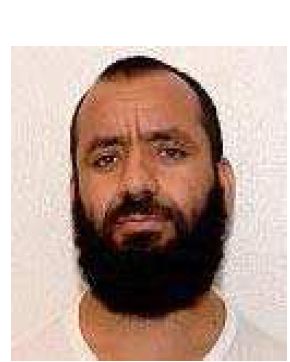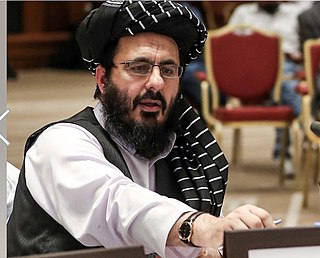Related Research Articles
Asif Iqbal is a British citizen who was held in extrajudicial detention as a terror suspect in the United States Guantanamo Bay detainment camps in Cuba from early 2002 to 9 March 2004.
Muhibullah or Moheb Ullah Borekzai is a citizen of Afghanistan who was held in extrajudicial detention in the United States' Guantanamo Bay detention camps, in Cuba. His Guantanamo Internment Serial Number was 546. American intelligence analysts estimate that Muhibullah was born in 1982, in Shah Wali Koot, Afghanistan.
Sha Mohammed Alikhel is a Pakistani who was held in extrajudicial detention in the United States Guantanamo Bay detention camps, in Cuba. On 8 May 2003, Muhammad was released at the same time as two other Pakistanis, Jehan Wali and Sahibzada Usman Ali. He was 20 years old.

Maasoum Abdah Mouhammad, a citizen of Syria, was formerly held in extrajudicial detention in the U.S. Guantanamo Bay detention camps, in Cuba.

Zia Ul Shah is a citizen of Pakistan best known for the time he spent in extrajudicial detention in the United States Guantanamo Bay detention camps, in Cuba. His Guantanamo Internment Serial Number was 15.

Mohammed Ahmad Said Al Edah is a citizen of Yemen who was held in the United States' Guantanamo Bay detainment camps, in Cuba, for fourteen and a half years. His Internment Serial Number is 33. Joint Task Force Guantanamo counter-terrorism analysts estimate he was born in 1962, in Hay al-Turbawi Ta'iz, Yemen.

Mawlawi Mohammad Nabi Omari is an Afghan politician serving as First Deputy Minister for Interior Affairs under the internationally unrecognized Taliban regime since 6 October 2022. He was also appointed Acting Governor of Khost Province in late August 2021. Omari was held for nearly twelve years in extrajudicial detention at the United States Guantanamo Bay detainment camps, in Cuba. His Guantanamo Internment Serial Number was 832. American intelligence analysts estimate that he was born in 1968, in Khost, Afghanistan. He arrived at the Guantanamo detention camps on October 28, 2002.
Abdul Rahim Ghulam Rabbani was a citizen of Pakistan who was held in the United States Guantanamo Bay detainment camps, in Cuba.

Mohammed Ahmad Ghulam Rabbani is a citizen of Pakistan who was extrajudicially detained by the United States military at the Guantanamo Bay detention camp in Cuba from 2004 to 2023. He was never charged with a crime, was never tried, and was a subject of enhanced interrogation techniques.
Lufti Bin Swei Lagha is a citizen of Tunisia who was held in extrajudicial detention in the United States's Guantanamo Bay detention camps, in Cuba. The Department of Defense reports that he was born on November 28, 1968, in Tunis, Tunisia.

Idris Ahmed ʽAbd al Qader Idris is a citizen of Yemen, who was held in the United States Guantanamo Bay detainment camps, in Cuba. His detainee ID number was 035. American intelligence analysts estimate he was born in 1979, in Rada, Yemen. Idris was transferred to Oman on June 13, 2015, where the Government of Oman agreed to what the Department of Defense called "appropriate security measures". He arrived on June 8, 2002, he was held in extrajudicial detention, and never faced criminal charges. The Department of Defense never fully released its justification for holding Idris, but on April 25, 2011, the Guantanamo Bay files leak was published.

Sharqawi Abdu Ali al-Hajj, also known as Riyadh the Facilitator, is a Yemeni alleged Al-Qaeda associate who is currently being held in the United States' Guantanamo Bay detention camps, in Cuba. He is accused of being a "senior al-Qaida facilitator who swore an oath of allegiance to and personally recruited bodyguards for Osama Bin Laden".
Jon Mohammad Barakzai is an Afghan man who was held in extrajudicial detention in the United States Guantanamo Bay detention camps, in Cuba. Mohammed was repatriated in October 2002, together with three elderly men, two Afghanis and a Pakistani. The men described being chained, for hours, during their interrogations.

Muhammed Murdi Issa Al Zahrani is a citizen of Saudi Arabia who was held in the United States's Guantanamo Bay detention camps, in Cuba from August 5, 2002, until November 22, 2014. His Guantanamo Internment Serial Number was 713. Joint Task Force Guantanamo counter-terrorism analysts estimate he was born in 1969, in Taif, Saudi Arabia.
Ejaz Ahmad Khan is a citizen of Pakistan who was held in extrajudicial detention in the United States's Guantanamo Bay detention camps, in Cuba.
Hamood Ullah Khan is a citizen of Pakistan who was held in extrajudicial detention in the United States's Guantanamo Bay detention camps, in Cuba. His Guantanamo Internment Serial Number was 145.
Tariq Khan is a citizen of Pakistan who was held in extrajudicial detention in the United States's Guantanamo Bay detention camps, in Cuba, for over a year.
Hafiz Liaqat Manzoor is a citizen of Pakistan who was held in extrajudicial detention in the United States's Guantanamo Bay detention camps, in Cuba. His Guantanamo Internment Serial Number was 139.

Muktar Yahya Najee Al Warafi is a citizen of Yemen who was held in extrajudicial detention in the United States Guantanamo Bay detainment camps in Cuba. The Department of Defense estimate that Al Warafi was born in 1974, in Ta'iz, Yemen.
References
- ↑ OARDEC (15 May 2006). "List of Individuals Detained by the Department of Defense at Guantanamo Bay, Cuba from January 2002 through May 15, 2006" (PDF). United States Department of Defense . Retrieved 29 September 2007.
- ↑ "'They interrogated us for hours'". The Guardian . 22 October 2002. Retrieved 17 June 2008. mirror
- ↑ "Afghans Describe Life Inside Gitmo". CBS News. 29 October 2002. Archived from the original on 16 May 2008. Retrieved 17 June 2008.
- ↑ "The oldest of the old: First 'hardcore' suspects freed from Camp Delta.. three Afghans, combined age 196". The Mirror . 30 October 2002. Archived from the original on 10 March 2004. Retrieved 17 June 2008.
- ↑ "Mohammad Sanghir – The Guantánamo Docket". The New York Times . Retrieved 17 January 2010.
- ↑ Christopher Hope; Robert Winnett; Holly Watt; Heidi Blake (27 April 2011). "WikiLeaks: Guantanamo Bay terrorist secrets revealed -- Guantanamo Bay has been used to incarcerate dozens of terrorists who have admitted plotting terrifying attacks against the West – while imprisoning more than 150 totally innocent people, top-secret files disclose". The Telegraph (UK) . Archived from the original on 15 July 2012. Retrieved 13 July 2012.
The Daily Telegraph, along with other newspapers including The Washington Post, today exposes America's own analysis of almost ten years of controversial interrogations on the world's most dangerous terrorists. This newspaper has been shown thousands of pages of top-secret files obtained by the WikiLeaks website.
- ↑ "WikiLeaks: The Guantánamo files database". The Telegraph (UK) . 27 April 2011. Archived from the original on 29 April 2011. Retrieved 10 July 2012.
- ↑ "Mohammad Sanghir: Guantanamo Bay detainee file on Mohammad Sanghir, US9PK-000143DP, passed to the Telegraph by Wikileaks". The Telegraph (UK) . 27 April 2011. Archived from the original on 3 July 2013. Retrieved 26 September 2012.
Recommendation: Release or transfer to the control of another country
- ↑ Andy Worthington (13 July 2011). "WikiLeaks and the Guantánamo Prisoners Released from 2002 to 2004 (Part Three of Ten)" . Retrieved 26 September 2012.
- ↑ "Pakistani says life in ruins after Guantanamo jail". Khaleej Times . 11 September 2006. Archived from the original on 30 September 2007. Retrieved 17 June 2008. - mirror Archived 2012-10-24 at the Wayback Machine
- ↑ LHC to hear damages suit by former Guantanamo detainee, Daily Times , June 24, 2004
- 1 2 Tahir Khan (27 September 2012). "Diaries of ex-Gitmo detainee: Reminding Obama of a 'broken promise'". The Express Tribune. Archived from the original on 27 September 2012.
A former inmate of the Guantanamo Bay detention centre reminded President Obama of his repeated promises to shut the notorious facility — where dozens of detainees continue to languish without trial.
- 1 2 3 4 "Cuba:Escape from Camp Delta". Le Monde . 11 March 2004. Archived from the original on 27 September 2007. Retrieved 3 July 2007.
- ↑ Tom Lasseter (15 June 2008). "Guantanamo Inmate Database: Page 1". Miami Herald . Archived from the original on 4 March 2009. Retrieved 16 June 2008. mirror
- 1 2 3 4 Tom Lasseter (15 June 2008). "Guantanamo Inmate Database: Mohammed Sagheer". Miami Herald . Archived from the original on 20 September 2008. Retrieved 16 June 2008. mirror
- 1 2 "Guantánamo's detainees unaware of Osama, WTC". Pakistan Observer . 8 March 2012. Archived from the original on 23 February 2013. Retrieved 8 March 2012.
The former Guantánamo Bay's Prisoner said that he was tortured by using various methods and was sexually harassed by American women in the prison during his detention.